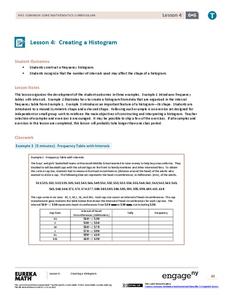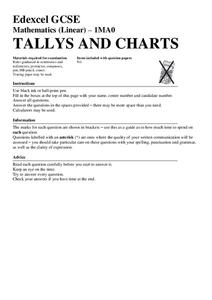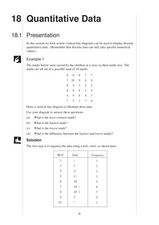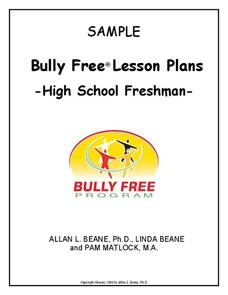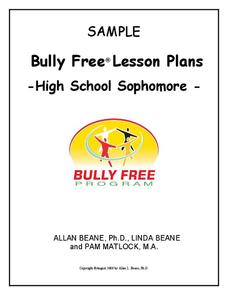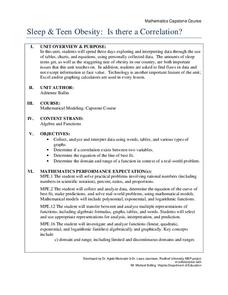Curated OER
Color in 3-D: A Nature Design Project
Students view a film about Hans Hofman and consider his use of color and layering. They experiment with the concept of 'push and pull' by using warm and cool color schemes in a tracing of leaves and shapes. Students view their work using...
Curated OER
Stream Table
Students build and erode a hillside. In this earth science lesson, students build a five inch hillside in a paint pan using sand, soil, and pebbles. They pour water over the hillside to monitor the erosion and how it is...
Curated OER
Developing the Concept: Rates
Learners discover how to use the knowledge of unit rates to understand equivalent ratios and solve real-world problems. They are given word problems to solve using equivalent ratios. Tables are also covered in this resource.
Curated OER
Zero Is Our Hero
Students engage in a lesson that is concerned with the mastery of counting by ten's. They practice counting to varying quantities not to exceed 100. Students could also use manipulatives that are separated into groups of ten.
Curated OER
ADULT ESOL LESSON PLAN--Level 2--Time and Money
Students , while daily reviewing the vocabulary terms on the board, identify and practice writing ordinal and cardinal numbers and know when to use them correctly. In addition, students are asked to share ordinal and cardinal numbers in...
EngageNY
Writing and Evaluating Expressions—Multiplication and Division
Don't table the resource on writing expressions for relationships in tables. Scholars investigate relationships between variables and write algebraic expressions involving multiplication and division. These expressions help solve...
EngageNY
Creating a Histogram
Display data over a larger interval. The fourth segment in a 22-part unit introduces histograms and plotting data within intervals to the class. Pupils create frequency tables with predefined intervals to build histograms. They describe...
Mathed Up!
Tallys and Charts
After watching a brief instructional video, young mathematicians are put to the test. By completing and reading frequency tables, tally charts, and bar graphs, individuals show their understanding of how to interpret data.
Curated OER
Speed
Fifth and sixth graders practice working in pairs to determine whether they can walk with constant speed. They test themselves, collect their data, draw graphs with their data collected, manipulate the data, and then draw conclusions...
Illustrative Mathematics
Foxes and Rabbits 2
The fox population chases the rabbit population. Groups model the populations of foxes and rabbits with two trigonometric functions. Individuals graph both trigonometric models on the same graph, and then teams determine an explanation...
Bully Free Systems
Bully Free Lesson Plans—11th Grade
It takes courage to stand up to bullies. Two sample lessons from a complete Bully Free curriculum, "Courageous and Brave Bystanders" and "Assertiveness Skills for Bullied Students and Empowered Bystanders" provide participants with...
Bully Free Systems
Bully Free Lesson Plans—12th Grade
Two sample lessons from a curriculum unit on bullying provide high school seniors with an opportunity to assess their online and cell phone behavior and to consider how they can offer support to bullied students. Each plan includes an...
Kenan Fellows
What Element Would You Be?
Primo Levi wrote a collection of short stories comparing his life from Italy to Auschwitz to elements in the periodic table. Pupils read an excerpt from his book and research the characteristics of various elements. Then, they make a...
Curated OER
Quantitative Data
In this quantitative data worksheet, pupils compute measures of central tendency, draw vertical line diagrams, and compare collected data. This 23-page worksheet contains approximately 100 multi-step problems. Explanations and examples...
Charleston School District
Review Unit 4: Linear Functions
It's time to show what they know! An assessment review concludes a five-part series about linear functions. It covers all concepts featured throughout the unit, including linear equations, graphs, tables, and problem solving.
DK Publishing
Practicing Multiplication Tables
Multiplication will be a breeze! Third graders work on both straightforward multiplication problems and word problems involving money and measurement. All problems involve multiplying numbers 0 - 10. A great homework assignment or...
EngageNY
Conducting a Simulation to Estimate the Probability of an Event II
Add some randomization into simulations. The 11th installment in a series of 25 presents two new methods to use in simulations--colored disks, and random numbers. Pupils use random numbers to run simulations where the probabilities make...
Bully Free Systems
Bully Free Lesson Plans—Ninth Grade
"Bullying and Prejudice" and "Do You Cyber Bully," two lessons from a complete Bully Free program, serve as samples of the approach used in a unit designed to bring awareness to and to combat bullying. Each lesson asks class...
Bully Free Systems
Bully Free Lesson Plans—10th Grade
Two lessons, "What Does Cyber Bullying Look Like?" and "Factors Influencing My Reporting the Bullying of Others," serve as examples of the 12 included in a Bully Free curriculum. Each plan includes discussion questions, an activity,...
Inside Mathematics
Coffee
There are many ways to correlate coffee to life, but in this case a worksheet looks at the price of two different sizes of coffee. It requires interpreting a graph with two unknown variables, in this case the price, and solving for...
Radford University
Sleep and Teen Obesity: Is there a Correlation?
Does the number of calories you eat affect the total time you sleep? Young mathematicians tackle this question by collecting their own data and making comparisons between others in the class through building scatter plots and regression...
Curated OER
Chemistry Review
In this chemistry review worksheet, students identify chemical changes, isotopes, ions, and chemical bonds. This worksheet has 32 multiple choice questions.
EngageNY
End-of-Module Assessment Task - Algebra 1 (Module 4)
Critical thinking is an important aspect of mathematics — it's time to put your brain to work! Use this assessment to challenge pupils and test their skills. Concepts assessed include function notation, factoring, completing the square,...
Bully Free Systems
Bully Free Lesson Plans—Seventh Grade
Having a hard time defining bullying with your seventh graders? Discuss the different types of behavior one would see in a bullying situation with a series of lessons, worksheets, and group activities.






